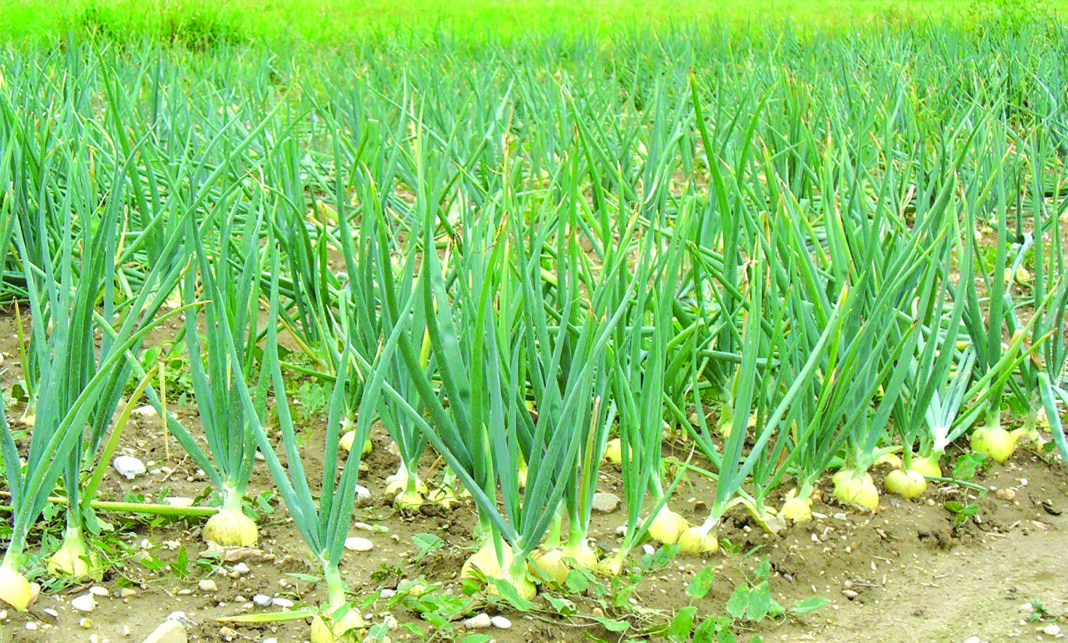Kabelo Masoabi
Onion cultivation is emerging as a beacon of hope for agricultural sustainability and economic empowerment in Lesotho and the recent research conducted by the Ministry of Agriculture, Food Security, and Nutrition, in collaboration with the Agricultural Productivity Programme for Southern Africa (APPSA), has shed light on the remarkable potential of onion production in the country.
The research evaluated the influence of weather patterns and soil structures on the development of bulb harvest-related traits of onion varieties in Mohale’s Hoek, Mpharane; Mafeteng, Marakabei; and Leribe, Mahobong.
The research was piloted using a combination of onion varieties of Akamaru, Australian Brown, Red Globe, and Texas Grano.
The findings indicate that the selected varieties can be cultivated successfully in the tested regions categorised as the lowlands and highlands.
According to Refuoehape Chabalala, a researcher at APPSA, all factors related to crop growth and bulb yield of onion varieties were mainly influenced by different fertilisers and soil structures.
Chabalala explained that some onions did well with organic manure while others favoured chemical fertilisers at differing places with dissimilar soil types.
“The study further reveals that adopting scientifically proven methods such as soil testing, seed selection, proper fertilisation and irrigation management can help optimise crop yield and attain sustainable agricultural growth, and these practices can also help reduce the dependence on chemical inputs, conserve natural resources, and enhance the quality of crops,” Chabalala noted.
The groundbreaking study delved deep into the intricate relationship between weather patterns, soil structures, and onion crop development.
By evaluating various onion varieties across different regions including Mohale’s Hoek, Mpharane, Mafeteng, Marakabei, and Leribe, Mahobong, Chabalala explained that researchers aimed to uncover the keys to unlocking the full potential of onion cultivation in Lesotho.
“The findings of the study have been nothing short of remarkable. It has become evident that implementing appropriate agronomic practices can significantly enhance onion crop productivity and yield and factors such as soil composition, fertilisation methods, and irrigation management have emerged as critical determinants of success,” the researcher said.
Khabele Ntlopo, an agri-scientist at the Department of Research within the Ministry of Agriculture emphasised the importance of the collected data, stating that it “forms part of the research meant to help smallholder farmers choose appropriate seeds and fertilisers that will perform best on different types of soil.”
“The findings will be documented, and the results will be published so that extension officers across the country will have access to, and the officers will further be trained to disseminate the information to farmers at the village level,” Ntlopo said.
The Agri-scientist noted that the study has underscored the importance of promoting sustainable agricultural practices.
“By reducing reliance on chemical inputs and embracing organic farming techniques, farmers can minimise environmental impact while enhancing crop quality.
“Organic fertilisers, such as compost and manure, have been found to enrich soil fertility and promote long-term soil health, contributing to overall agricultural sustainability,” he said.
Matente Khethisa, a farmer from Ha Lobiane in Mahobong, who was one of the selected participants in the Agricultural Productivity Programme for Southern Africa (APPSA) research said she worked diligently with area farmers and scientists to achieve successful onion production on her field as part of the project’s pilot program.
Despite facing challenges such as excess rainfall and severe drought, Khethisa revealed she managed to overcome the setbacks with the guidance of the researchers and a reliable source of water.
Khethisa expressed her confidence in the technology used and was enthusiastic about sharing her knowledge with other farmers in the community.
Chabalala noted the success of the onion cultivation study is a testament to the power of collaboration and innovation in driving agricultural development.
“By bringing together government agencies, research institutions, and international partners like APPSA, Lesotho has been able to harness cutting-edge research to address key challenges facing its agricultural sector,” she said.
Ntlopo pointed out that as Lesotho continues to explore the potential of onion cultivation, there is a sense of optimism and excitement about the future among farmers who participated in the study.
“By embracing innovation and sustainable practices, the country is poised to unlock new opportunities for agricultural growth and prosperity. With continued investment in research and technology, onion production could emerge as a cornerstone of Lesotho’s agricultural landscape, contributing to food security and economic resilience for generations to come,” he asserted.
The study findings are poised to be disseminated by extension officers to farmers across Lesotho.
The Agricultural Productivity Programme for Southern Africa (APPSA), originally launched in Malawi, Mozambique, and Zambia, now includes Lesotho and Angola, underscoring its commitment to fostering agricultural innovation and sustainability in the Southern African Development Community (SADC) region.




